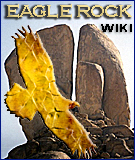Difference between revisions of "Compost"
From eagle-rock.org
| Line 11: | Line 11: | ||
<gallery caption="" widths="170px" heights="120px" perrow="4"> | <gallery caption="" widths="170px" heights="120px" perrow="4"> | ||
| − | File:Compost arrangement.jpg|Compost arrangement. Preparing compost to fertilize the soil is one of the most important things to do in a garden. | + | File:Compost arrangement.jpg|Compost arrangement. Preparing compost to fertilize the soil is one of the most important things to do in a garden. |
| + | File:Cow manure compost.jpg|Making compost from liquid cow manure. Liquid cow manure contains substances that are poisonous for a healthy life of micro-organisms in the soil. When however the cow manure is composted it can be made into a fertilizer that smells pleasantly and is good for the soil. | ||
</gallery> | </gallery> | ||
Revision as of 17:28, 22 December 2011
This page is to prepare and collect information for one or more chapters in the course.
Chunks of information
- Important to get good compost is to have the right mix of materials. I use soil, animal manure, grass clippings, weeds that were taken out from the garden, used coffee grounds, straw etc.
The bacteria that transform organic material into compost need oxygen, water and the right mix of carbon (C) and nitrogen N). The ideal mix is C:N = 30:1. Fresh grass clippings have an average ratio of about 15 to 1 and dry autumn leaves about 50 to 1 depending on species. Mixing equal parts by volume approximates the ideal C:N range. Some more examples: sawdust 200-750:1, cow manure 10-30:1, soil 12:1, etc. See this article for more details http://www.grow-it-organically.com/compost-ingredients.html
- I also always add agricultural lime, lava flour and clay grains (bentonite). I scatter a few hands full of these materials on top of each layer that ideally already has a perfect or near-perfect mix of C:N.
- After about 1 to 2 months the pile can be re-handled. Inside the pile already much of the compost is ready and i throw it on top of a big sieve (you can see it in the photo) to separate the fine material from the rough parts. What doesn't go through the sieve goes back on the compost heap.


